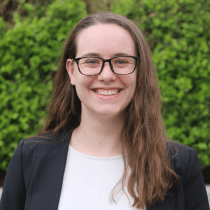
Taylor Fazzini
What is your next adventure?
In June, I will be starting full-time as a systems engineer with Northrop Grumman in their Future Technical Leaders program, a three-year rotational that will give me a chance to try different jobs in different parts of the company. The thing is, now, I don't know where I will start. I just know that, the first year, anyway, they try to put you somewhere outside your specialty.
What about your next adventure are you most looking forward to?
One of the things that's really great is that I get to live in three different cities: one year in Chicago, one year in San Diego, and one year in D.C. I'm really excited to be able to explore the different business units - things like contracting and planning, for instance. I will really be able to develop different people skills.
Did you have any previous co-op, internship, or research experience in this area?
As an undergrad, at Embry Riddle, I did five rotations at Gulfstream. That's where I met a lot of Georgia Tech students, who were also there on internships. My last one was in preliminary design and supersonics, and it gave me CFD experience that really stood out when I came to Tech for my master's. In fact, I remember during orientation day, when Dr. Tai was were telling all of the grad students to check out different projects, to see what they liked, he added "Except for two of you..." I was one of the students he pulled aside for a project with the Ascent 10, an FAA project that needed CFD and supersonic experience. It was a perfect fit. We've worked on three different aircraft doing aerodynamic analysis and developing tools they didn't have.
How did your educational experience at Georgia Tech help you to achieve your goals?
Working in the ASDL has done more than I ever thought possible to broaden my knowledge of the discipline. ASDL's approach of introducing us to systems engineering -- high-level designs - taught me how to not just adapt but to thrive outside my comfort zone. I worked on things I never thought I would do, like an unmanned aircraft with active flow control. Dr. Glazer's done a lot of work on that, but now I get to work on it, too. And ISR - [intel, surveillance, & reconnaissance], where you analyze how the military command operations use UAVs and satellites. Now that I am going into Northrop Grumman's Future Technical Leader program, I will have a better grasp on how to adjust to new challenges.
What advice would you give to an underclassman who would like to follow the same path?
I would definitely recommend you get involved in a professional organization - like AIAA [American Institute of Aeronautics and Astronautics], which is what I did. It's a great network-builder, which is something every engineering student needs to do at some point. The organizations give you a chance to present research and to meet others who are doing the same work. Even if you are not presenting, go so that you can keep up with your peers. These are people who will be career-long connections and even leads for jobs in the future. This was incredibly helpful for me, because I didn't know anyone at Georgia Tech when I got here, but I had met some at conferences.